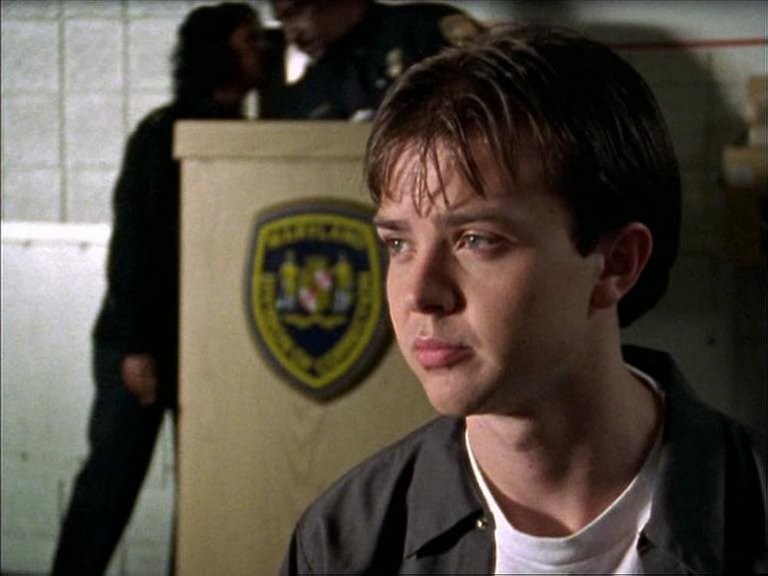Television Review: Kellerman, P.I.: Part 2 (Homicide: Life on the Street, S7X09, 1998)

Kellerman, P.I.: Part II (S07E09)
Airdate: 11 December 1998
Written by: Sean Whitesell
Directed by: Jay Tobias
Running Time: 44 minutes
The seventh and final season of Homicide: Life on the Street (1993–1999) unfolded against a backdrop of dwindling ratings, departing cast members, and a palpable sense of creative exhaustion. By late 1998, the writing was on the wall: the show, once a critical darling for its unflinching portrayal of urban crime and police work, was nearing its end. The decision to make Kellerman, P.I.: Part II (originally broadcast on 16 December 1998) the last Christmas-themed episode might have seemed, to a network executive, an opportunity for a festive send-off. Instead, the creators chose to reject the saccharine conventions of holiday television, transforming the season’s inherent melancholy into a bleak coda. The episode’s use of the holidays as a semi-ironic framing device underscores the show’s refusal to sentimentalise its own demise, positioning it as a stark, unflinching conclusion to a series that used to prioritise moral ambiguity over easy answers. In doing so, Kellerman, P.I.: Part II became a testament to its reputation as one of the darkest and most uncompromising dramas of 1990s American television.
The episode’s narrative hinges on the tragic fallout of two teenagers’ flawed decisions. Craig Halpern (Charles Gunn), a high school student, has fathered a child with his girlfriend Debbie Straub (Jena Malone), whose wealthy family orchestrates a Faustian bargain to protect her. After secretly delivering their infant son in a seedy motel room, the couple faces charges of infanticide—a crime Debbie’s family manipulates her into testifying against Craig to get light punishment. The cliffhanger ending of the first part, which leaves Debbie’s decision to testify unresolved, amplifies the tension, making the second instalment’s grim denouement all the more devastating.
The second part of the episode begins with Assistant State Attorney Danvers (Željko Ivanek) reluctantly finalising the case against Craig. Despite his discomfort with the Straubs’ manipulative tactics, Danvers secures a swift conviction—a resolution that leaves Detective Falsone (Jon Seda) simmering with resentment. Falsone’s disdain for the system’s inequities manifests in his visit to Craig in jail, where he attempts to coax a the boy to save himself by testifying against Debbie—a futile effort given Craig’s delusional faith in Debbie’s loyalty. The scene captures Falsone’s frustration not only with the legal process but also with his own powerlessness. When Craig’s suicide follows his sentencing—a fate rendered with harrowing understatement—the episode’s emotional core crystallises: love, misplaced trust, and societal indifference collide to produce tragedy. Craig’s death, layered atop the infant’s, amplifies the episode’s bleakness, rejecting catharsis in favour of unresolved grief.
Central to the episode’s tension is the fraught relationship between Mike Kellerman (Reed Diamond) and Falsone. Kellerman, the disgraced former homicide detective turned PI, represents the show’s exploration of moral compromise. Hired by the Straubs to defend Debbie, he initially appears complicit in her deceit. Yet his quiet redemption arc—secretly gathering evidence to exonerate Craig—reveals a flicker of integrity beneath his cynicism. The moment Kellerman anonymously delivers tapes of Debbie’s clandestine communications with Craig to Falsone is a masterstroke of narrative economy: it underscores their mutual disdain while hinting at grudging respect. Falsone’s reluctant acknowledgment of Kellerman’s actions—a shared drink in a Christmas-lit bar—epitomises the show’s signature blend of grit and humanism. Their uneasy truce, forged over tragedy, serves as a metaphor for the series itself: flawed, imperfect, yet stubbornly resilient.
While Kellerman, P.I.: Part II adheres to Homicide’s tradition of unvarnished realism, it rarely ventures into new territory. The episode’s grim resolution—two deaths, one perpetrator unpunished—is familiar terrain for a show that often left crimes unsolved and justice elusive. Yet this predictability is precisely its strength: the story’s inevitability mirrors the inexorable decay of the show’s own run. Sean Whitesell’s script, though occasionally clunky, aligns with the series’ early ethos, where moral complexity trumped narrative contrivance. The lack of a tidy ending—Craig’s suicide, Debbie’s hollow victory—reflects the grim realities of Baltimore’s socioeconomic underbelly, a theme Homicide had consistently refused to soften.
Jon Seda’s portrayal of Falsone remains divisive, as the character’s role as the show’s “moral anchor” often felt forced. Yet in this episode, Seda’s performance transcends the character’s flaws, conveying Falsone’s simmering anger and weariness with quiet intensity. Similarly, Reed Diamond’s role is standout achievements. As Kellerman, Diamond embodies the character’s self-loathing and latent guilt. The chemistry between Seda and Diamond, particularly in their tense, wordless exchanges, elevates the episode beyond mere plot mechanics.
Despite its strengths, the episode stumbles in moments that undercut its otherwise grim tone. The abrupt, almost farcical confrontation between Kellerman and Detective Stivers (Toni Lewis)—a throwback to earlier seasons’ penchant for physical altercations—feels tonally misplaced. Similarly, the subplot involving Falsone’s romantic entanglement with Detective Laura Ballard (Callie Thorne) descends into soapy melodrama. After Falsone stands Ballard up for a date, her subsequent, half-hearted attempt to ask colleagues for lunch is a cringe-worthy detour into cliché. These missteps, though minor, remind viewers that Homicide’s later seasons often struggled to balance its gritty realism with the demands of episodic television.
Kellerman, P.I.: Part II could have been a fitting finale for a series that thrived on moral complexity and unflinching realism. Its refusal to offer solace or tidy resolutions mirrors the show’s own trajectory: a flawed, often brilliant work that refused to pander to convention. While it lacks the narrative ingenuity of earlier episodes, its emotional resonance and thematic coherence cement its place as one of Homicide’s finer hours.
RATING: 6/10 (++)
Blog in Croatian https://draxblog.com
Blog in English https://draxreview.wordpress.com/
InLeo blog https://inleo.io/@drax.leo
LeoDex: https://leodex.io/?ref=drax
Hiveonboard: https://hiveonboard.com?ref=drax
Rising Star game: https://www.risingstargame.com?referrer=drax
1Inch: https://1inch.exchange/#/r/0x83823d8CCB74F828148258BB4457642124b1328e
BTC donations: 1EWxiMiP6iiG9rger3NuUSd6HByaxQWafG
ETH donations: 0xB305F144323b99e6f8b1d66f5D7DE78B498C32A7
BCH donations: qpvxw0jax79lhmvlgcldkzpqanf03r9cjv8y6gtmk9